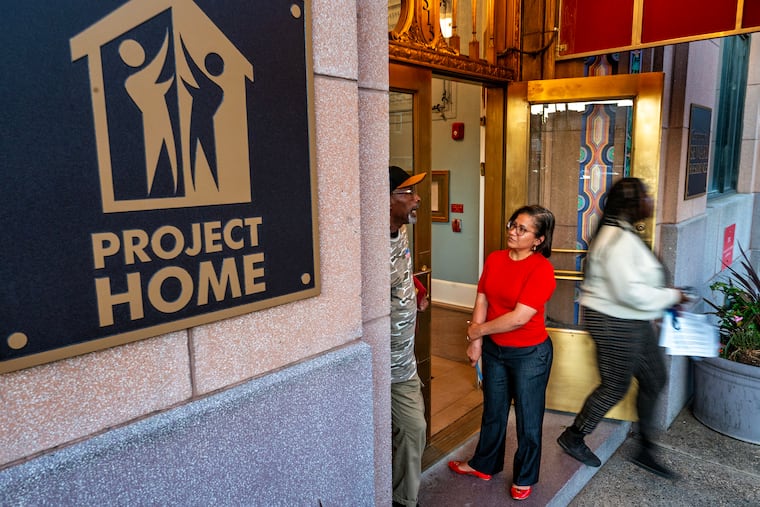Trump’s executive order on homelessness and mental illness discards what works
The president’s order trades on worn-out myths about the relationship between mental illness and violence, while leaning into the familiar politics of disorder, danger, and urban decay.

At the end of July, the White House issued an executive order focused on homelessness titled “Ending Crime and Disorder on America’s Streets.” The order explicitly targets Housing First — an approach to housing that provides people who are homeless with permanent housing, rapidly and without preconditions such as sobriety or participation in treatment programs. Once housed, people have access to voluntary supportive services to help them maintain their housing and improve their overall well-being.
The president’s order calls for federal agencies to end their support for these initiatives and instead begin “[s]hifting homeless individuals into long-term institutional settings.” But that won’t solve our housing crisis — and it certainly won’t achieve the president’s goal to “restore public order.”
By redirecting funding away from Housing First programs, the president’s order threatens the fragile progress that dozens of cities have made toward ending homelessness.
Since 2011, Houston has reduced chronic homelessness by nearly 70%, and overall homelessness by more than 60%, housing more than 26,000 people through its Housing First initiative, the Way Home. While homelessness and unsheltered homelessness have reached record levels in the United States, between 2007 and 2016, homelessness declined by an impressive 15%. What’s more, those declines occurred during a period that included the Great Recession, when unemployment doubled, banks failed, and millions of homeowners were unable to pay their mortgages.
Instead of encouraging cities to sweep encampments and disappear homeless people into institutions, the Obama administration responded to our national crisis with a $1.5 billion investment in a new initiative: the Homelessness Prevention and Rapid Re-Housing Program. That program prevented homelessness by providing short-term rental assistance and case management for households facing eviction.
Between 2007 and 2016, our national inventory of permanent supportive housing also increased by more than 80% — a surge that began under the Bush administration and continued through the Obama years.
Those strategic shifts laid the foundation for more responsive and accountable homelessness response systems nationwide. Sadly, instead of doubling down on what works, the Trump administration is trying to dismantle it.
The administration’s budget proposal for the 2026 fiscal year includes sweeping changes that would effectively eliminate federal investments in the Continuum of Care and Housing Opportunities for Persons With AIDS programs, both of which are crucial sources of funding for permanent supportive housing. The White House has proposed to roll those dollars into the Emergency Solutions Grant program, but those dollars are limited to short-term or medium-term assistance (i.e., a maximum of two years).
Rather than instructing federal agencies to scale proven solutions like permanent supportive housing and rental assistance, the president’s order trades on worn-out myths about the relationship between mental illness and violence, while leaning into the familiar politics of disorder, danger, and urban decay.
In reality, most people who have been diagnosed with a psychiatric disorder never engage in violence, and only a small fraction of violence in the United States is attributable to mental illness alone.
While some studies have shown that participation in an assisted outpatient treatment program is associated with positive outcomes, including reductions in hospitalizations and arrests, the same research suggests that those benefits largely depend on access to high-quality services, not the court order itself.
The president’s order would reward cities and states for clearing encampments, but vigorous enforcement of anti-camping laws won’t solve our problems, either. Without a meaningful pathway to permanent housing, orders to move along simply shuffle people from block to block without resolving their housing status.
In Philadelphia, we are keenly aware of the complexities that surround ending and preventing chronic street homelessness. Since 1989, Project HOME has been on the front lines of combating homelessness with proven, evidence-based approaches.
Today, Project HOME has more than 1,000 units of housing and offers a range of supportive services across Philadelphia. In fiscal year 2025, 96% of our residents in permanent supportive housing were stably housed for one year or more, and 84% maintained a stable income.
Their successes — and the richness of their lives — stand as a powerful testament to a simple truth affirmed by the U.S. Supreme Court nearly 50 years ago in O’Connor v. Donaldson: “[T]he mere presence of mental illness does not disqualify a person from preferring his home to the comforts of an institution.”
We will continue to examine the implications of this executive order, but we will do so with the deeply held conviction that having a disabling condition should never mean spending the rest of your life in an institution.
None of us are home until all of us are home.
Candice Player is vice president of advocacy, public policy, and street outreach at Project HOME in Philadelphia.